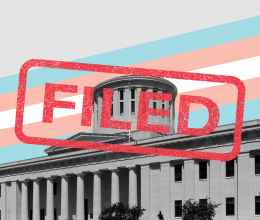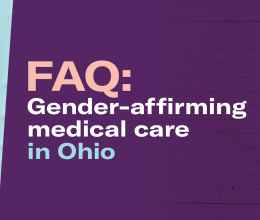Discrimination hurts people. It’s wrong for someone to look at you, your significant other or you family and say, “We won’t serve you here.”
With the recent passage of Indiana’s RFRA (Religious Freedom Restoration Act), people are right to be outraged. Many have looked to past injustices to highlight the harms of discrimination based solely on someone’s identity. Some say that denying service to a gay couple at a business is the same as denying service to a black couple.
But it’s not the same thing.
Post Racial Myths
Saying the struggle for LGBT rights is the same as movements for racial justice during the 1950’s-1970’s creates problems for both groups. This comparison reinforces the myth of a post-racial society, where the injustices of racism are a relic of the past, cured by that era’s heroes and irrelevant to our modern debates.
Learn more about our work advancing racial justice.
Anyone who has attended a protest, planning meeting, or community conversation around police practices knows that this is not the case. While our laws and policies in this country may appear race-neutral in their intention, you will be hard-pressed to find a measure of social well-being that is not stratified by race. Racial injustice is woven through social and political institutions in ways that create unique struggles for people of color in this country.
One-To-One
Trying to equate racial justice movements with the quest for full legal recognition of LGBT people also risks alienating potential allies. Even with good intentions, people do not want to have their experiences spoken for, appropriated or recast for someone else.
While there is power in articulating a struggle and having someone find harmonies with their own experience, using someone else’s identity or history as a tool to advance your own can create divisions instead of coalitions.
Read more about RFRA and LGBT discrimination.
This one-to-one comparison ignores the reality that we are all the product of multiple identities. The way people experience race and sexuality is also complicated by an entire array of social markers like class, gender, gender expression, age and ability status. Even the use of LGBT wraps certain people together into the same group, who do not have the same protections under current laws.
To say that refusing a gay couple is the same as refusing a black couple ignores the fact that a person may look at your clothes, company, or skin color and draw conclusions about who you are and how you should be treated.
In Need of Remedy
Discrimination against LGBT people is wrong and harmful. It’s an injustice desperately in need of remedy. Everyone should have the protection to know that when they enter an establishment open for public business, they will not be refused service simply because of who they are.
But we need not diminish the experiences of others to make this point. These stories can speak for themselves.






